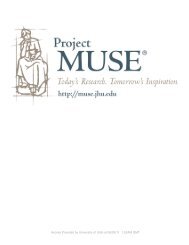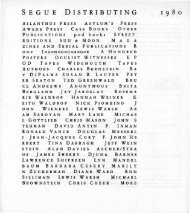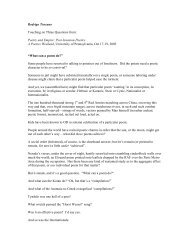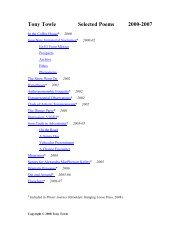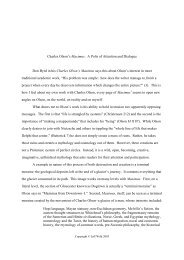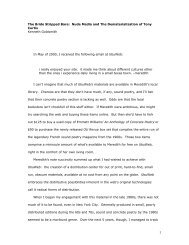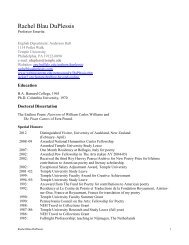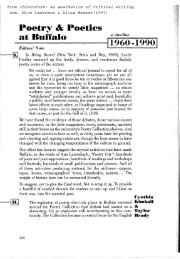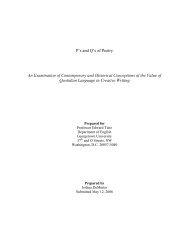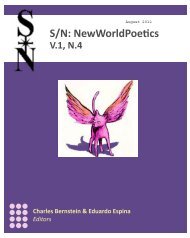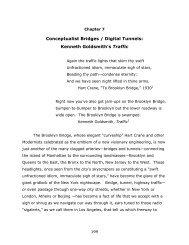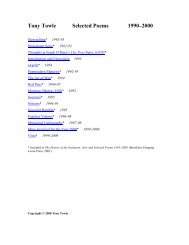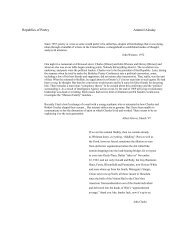Preface - Electronic Poetry Center
Preface - Electronic Poetry Center
Preface - Electronic Poetry Center
Create successful ePaper yourself
Turn your PDF publications into a flip-book with our unique Google optimized e-Paper software.
Actually, the question of age is a complex one all on its own. One of the real<br />
values of The Art of Practice is its inclusion of a number of poets<br />
generationally part of G1 who did not begin publishing until later than most of<br />
those in Tree. (I’m reminded, say, how late both Jackson Mac Low and Hannah<br />
Weiner were to publish regularly. When Jackson was my age, 48, he had<br />
exactly 6 books in print.)<br />
But I do think that there’s a generational dynamic (different for each G) that<br />
focuses when poets are under still well under 35, and that to wait longer as a<br />
generation to begin to stake out a space is itself a notable step, so that the<br />
hesitancy implicit there must itself be looked at as part of the process (Think of<br />
Olson’s age in comparison to Creeley, Blackburn et al, or of Burroughs to<br />
Ginsberg & Kerouac, or of Williams to the Objectivists.)<br />
>To clarify one general point in closing: I am not under the impression<br />
> that a collective re-definition of what poetry is and does has as yet been<br />
> articulated by G2<br />
Yep, except for Pam, Lew, Kristin & Alan have at least made one stab.<br />
>Given the way literary fields work in capitalist social formations, the<br />
> failure to achieve such a collective redefinition will lead to a lot of<br />
> interesting poetry disappearing<br />
Absolutely! Several G1ers have noted in recent years how much the O-blek 12<br />
formation of G2 reminds them of the younger writers who found themselves<br />
active around certain modes of the NAP in the mid- to late-60s. David Schaff,<br />
Bill Deemer, Harold Dull, d alexander, Lowell Levant, Ed Van Aelstyn, John<br />
Gorham, Gail Dusenbery, Stan Persky, Seymour Faust, George Stanley,<br />
William Anderson, Wilbur Wood, etc etc etc. But failing to distinguish their<br />
terms from NAP1, NAP2 proved unable, unwilling to set up the institutions that<br />
might have insured their own communities’ perpetuation into the future.<br />
I am amazed and appalled that neither the Messerli nor the Hoover anthologies<br />
include the work of Lew Welch. In the 1960s, he would have come into almost<br />
any listing of the 24 or so most influential NAPpers. Such is history. You have<br />
to write it yourself.



